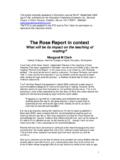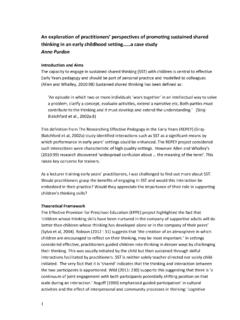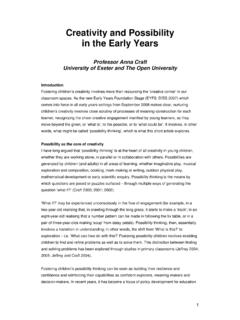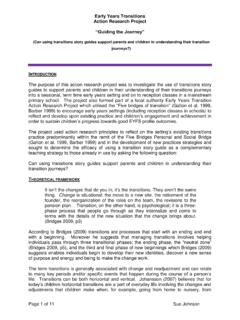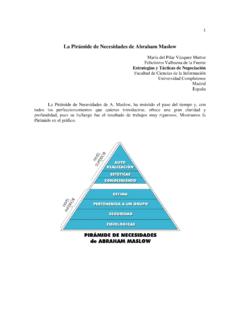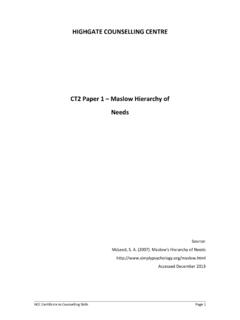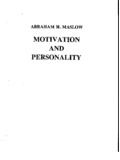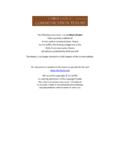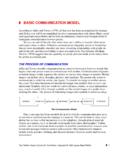Transcription of Dimensions of early years professionalism - attitudes ...
1 Dimensions of early years professionalism - attitudes versus competences? Avril Brock, Leeds Metropolitan University Being a professional working with young children is not just about meeting standards; it s about attitude, ideology and passion according to my research with a sample of early years educators. early years practitioners are characterised by their commitment to young children when they discuss early years issues, their voices are powerful and there is a wealth of expertise and knowledge. Yet historically there have been particular difficulties in the field of early years in defining the nature of professional knowledge, skills and beliefs of its practitioners.
2 A plethora of initiatives and policy documents have been introduced in this last year that aim to raise the status and qualifications of those working with young children. Osgood (2006:1) proclaims that the UK early years workforce is receiving unprecedented attention from policy-makers, economists, mass media and commercial business investors . She observes that the voice of the early years community (including academics, teacher educators, local policy-implementers and practitioners) is small, but the workforce is enormous and continuing to grow (p1). This has to be good news for early years educators and for young children and their families.
3 early years requires an articulate, reflexive and highly qualified workforce, since the abilities to evaluate and develop policy and practice are key to its claims to professionalism . professionalism is a contemporary issue, acquiring a high profile in education and more recently in early years education and care. However, the emphasis appears to be on deriving a body of standards or competencies that teachers, early years professionals, integrated centre managers need to acquire rather than what it is to be a professional. It seems that little has been taken into account of the EY professionals themselves their personalities, relationships, personal ideals, feelings and passion.
4 This reflection for TACTYC draws on the findings from my doctoral research, which was undertaken with a range of respondents who work in early years . I use the phrase early years educators to encompass the range of roles of those who are involved in young children s education. My research aimed to elicit their thinking about their professionalism , to promote recognition 1of the complexities of their roles and so contribute to a potential model of early years professionalism . That there is a need to listen to early years educators voices to fill in gaps in the perceptions of theorists and to offer indications for policy-makers in the field has now been well established.
5 There have been several consultations organised by the Children s Workforce Development Council (CWDC): the standards for the new early years Professional (EYPs); the early years Foundation Stage on-line consultation; the new standards for Integrated Centre Leadership and the Transformation Fund implications for Local Authorities. Jane Heywood commenced the CWDC EYPs consultation in Leeds by requesting a perfect workforce of the future to get the early years right , that it was a political imperative to have standards that work across all settings. She stated that she wanted early years professionals to be self-valuing and to get a buzz through enjoying working with young children from birth-to-five.
6 These were valuable and essential statements, yet does this enthusiasm emanate through the standards? Are they presented as a body of competencies to be acquired? In my opinion important intrinsic values that should be essential for being a professional working with young children had been omitted. Is passion actually embedded in the standards and is it possible to measure aspects of passion? Being a professional working with young children, according to the sample of EYEs in my research, is not just about having qualifications, training, skill, knowledge and experience but also about attitudes and values, ideology and beliefs, having a code of ethics, autonomy to interpret the best for children and families, commitment, enjoyment and passion for working with children.
7 It seemed to me that little has been taken into account of these factors in the draft standards. It is essential that professionals working with young children should be expected to be committed, enthusiastic, interested and enjoy their work, because this will infect those with whom they work. These are not just the rewards of working with young children, but should be the requisites. EYPs, like the EYEs in my research, should value the personal elements of the relationships with young children and their families, as personal ideals and values are important for professionals. They should be valued for being passionate, and encouraged to be so.
8 These elements must emanate through the standards. CWDC needs to demand this passion not just through listing competencies of what EYPs should perform, but also to research EYEs voices about what they perceive to be the professional aspects of their work. Whilst representatives of 2 CWDC assure us that they have consulted EYEs, parents and children and are taking their voices into account, how have these voices been elicited and what depth of elicitation has occurred? There is no doubt that the majority of us want this passion from those who work with young children. Moyles (2001) debated the issues of passion and paradox as being the essence what we need from professionals working in the early years that they need opportunities for passionate discussion and debate of critical issues, with time to stand back and engage in discourse at a professional level.
9 We need to access this passion, not just through listing competencies of what professionals in the early years need to be able to perform, but also through on-going listening and eliciting of their thinking; to research their voices and acquire their thoughts on what they perceive to be the professional aspects regarding their work with young children. Smit (2003) advocated that policy-makers should take notice of teachers emotional responses and dispositions towards educational changes. The field requires a knowledgeable, highly qualified and articulate workforce and early years professionals, themselves, need to advocate what their own professionalism entails (Moyles, 2001; 2002; Edgington, 2004).
10 The ability to reflect on and evaluate one s professional role, its practical application and one s own thoughts about it must be the key to professionalism in the early years . This reflection is clearly an important aspect of the new qualifications. The need to define professionalism has been a contemporary and contentious issue that has merited the concern of several fields of disciplines sociology, philosophy, history, management and education. Many draw upon the theories of the sociologist, Friedson, who offered no single explanatory trait or characteristic of professionalism , asserted that it was not a generic concept, but a concrete, changing, historical and national phenomenon (Friedson, 1994:7).
